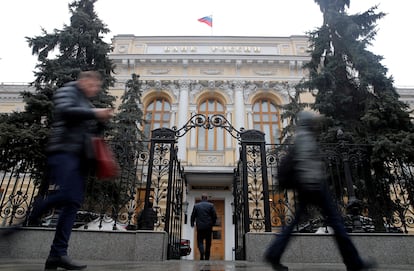The Kremlin defaults on foreign debt for the first time since the Russian Revolution
On Sunday, the grace period for $100 million in interest payments for Eurobonds expired, but Moscow says it is ready to pay in rubles

The last time Russia defaulted on its foreign debts was during the Russian Revolution, when the Bolsheviks refused to recognize the tsar’s obligations in 1918. More than a hundred years later, the government of Vladimir Putin has defaulted, according to several reports. The impact will largely be symbolic as Russia has already been cut off by a large part of the international financial market in response to its invasion of Ukraine, which triggered a wave of economic sanctions.
The grace period for $100 million in interest payments for Eurobonds – originally due on May 27 – expired on Sunday. The Kremlin argued it was unable to make the payment due to the economic sanctions, which banned Russia from using foreign currency, according to US agency Bloomberg. The two bonds are set to mature in 2026 and 2036, for which investors expect to receive $71.2 million and €26.5 million. As reported by Reuters, Moscow tried to transfer the money at the end of May, but some Taiwan holders of Russian Eurobonds did not receive the interest due. Thus, global markets are faced with a “unique situation” when a borrower is ready to pay off creditors, but cannot do this due to sanctions.
Russia had defaulted on payments to Russian creditors in the 1998 crisis, but this is the first time it has defaulted on foreign debt since 1918. The Kremlin’s access to markets has been very limited for months due to the economic sanctions. None of the three major risk rating agencies, Moody’s, S&P and Fitch, have announced the default because these firms suspended all their business in the country in March, when the European Union prohibited this type of activity with Russia.
Moscow’s creditors could have announced the default, but Bloomberg believes that Moscow will choose to keep a low profile while waiting to see how the crisis unleashed by the conflict against Ukraine is resolved. It is a difficult situation: the Kremlin has announced that from now on it will pay its obligations by depositing rubles in a financial entity that is under sanctions.
The US Treasury Department made an exception during the first months of the conflict and allowed Moscow to pay its foreign debt. However, this door was closed in May and Putin approved a decree on June 22 to allow the unilateral payment of debts in rubles instead of the amounts originally agreed in dollars and euros.
The Russian Economy Minister Anton Siluanov accused the West of creating “artificial barriers” and said that Moscow was ready to pay in rubles.
Tu suscripción se está usando en otro dispositivo
¿Quieres añadir otro usuario a tu suscripción?
Si continúas leyendo en este dispositivo, no se podrá leer en el otro.
FlechaTu suscripción se está usando en otro dispositivo y solo puedes acceder a EL PAÍS desde un dispositivo a la vez.
Si quieres compartir tu cuenta, cambia tu suscripción a la modalidad Premium, así podrás añadir otro usuario. Cada uno accederá con su propia cuenta de email, lo que os permitirá personalizar vuestra experiencia en EL PAÍS.
¿Tienes una suscripción de empresa? Accede aquí para contratar más cuentas.
En el caso de no saber quién está usando tu cuenta, te recomendamos cambiar tu contraseña aquí.
Si decides continuar compartiendo tu cuenta, este mensaje se mostrará en tu dispositivo y en el de la otra persona que está usando tu cuenta de forma indefinida, afectando a tu experiencia de lectura. Puedes consultar aquí los términos y condiciones de la suscripción digital.








































